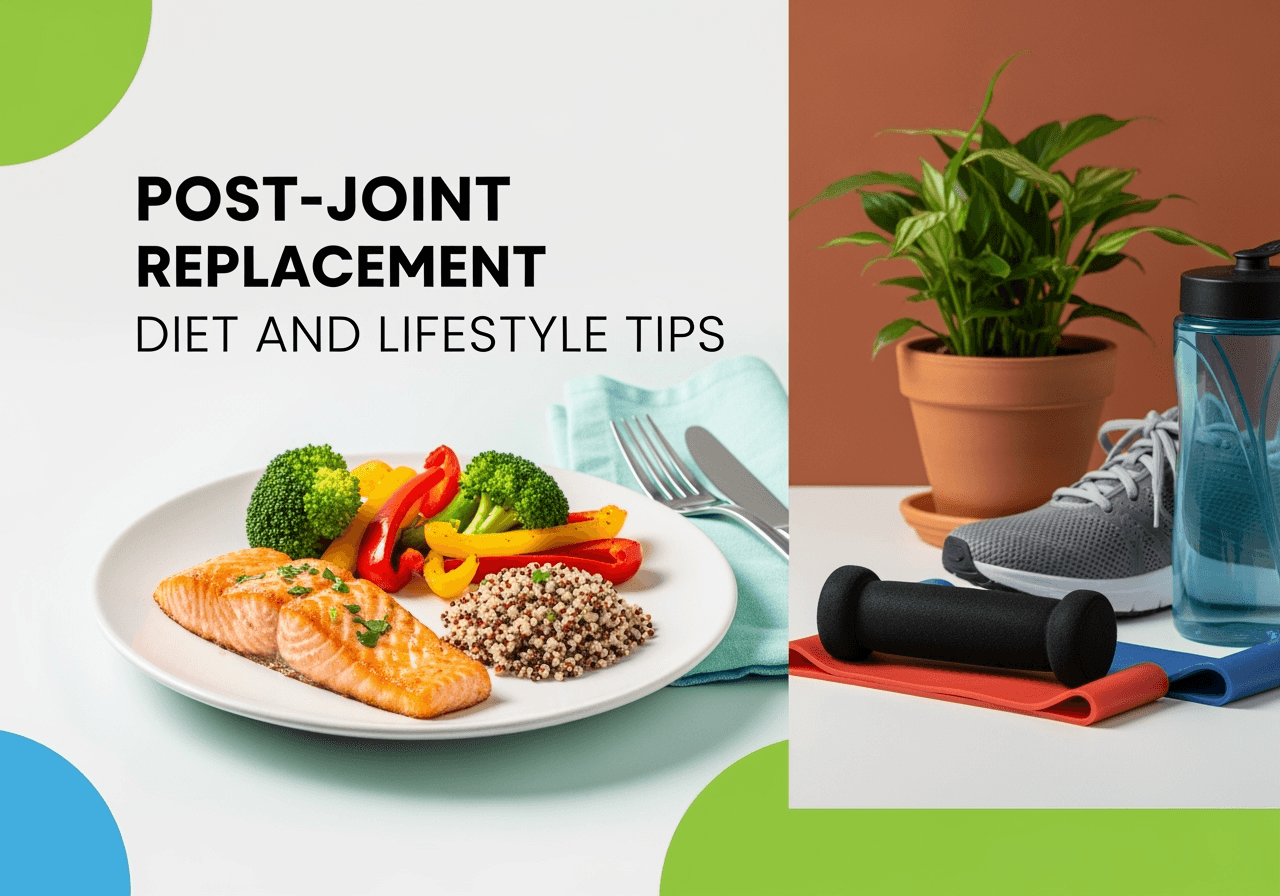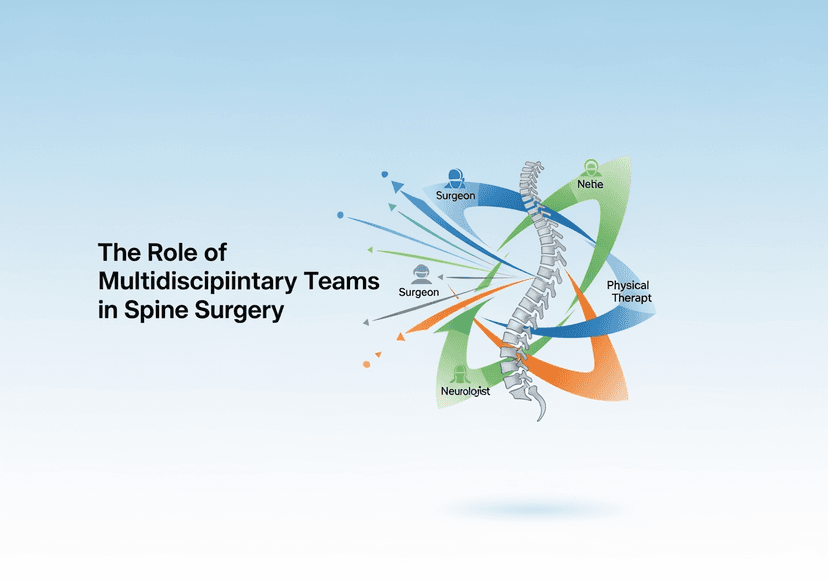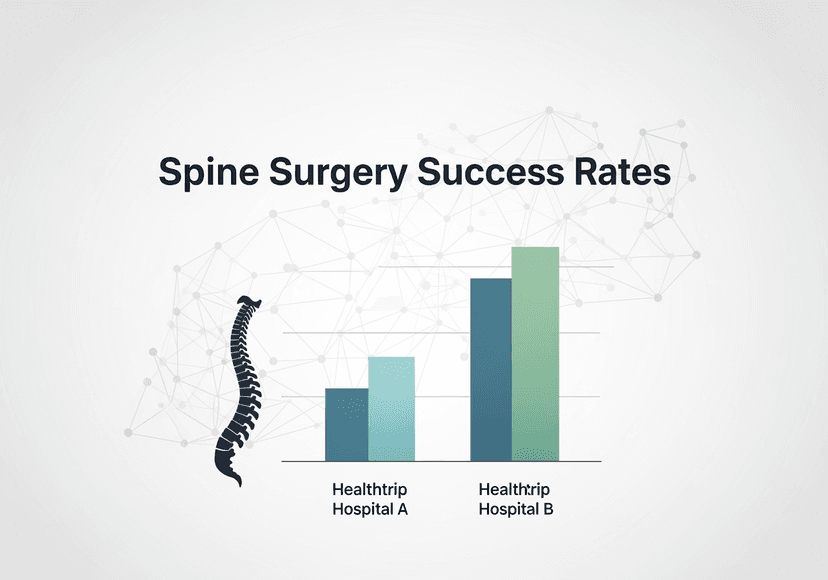
Post-Joint Replacement Diet and Lifestyle Tips
14 Oct, 2025
 Healthtrip
Healthtrip- Where to Begin: Setting the Stage for Recovery
- The Nutrition Powerhouse: Foods to Fuel Healing
- Foods to Avoid After Joint Replacement Surgery
- Lifestyle Adjustments: Optimizing Your Recovery Environment
- Seeking Expert Insights: Hospitals and Professionals to Consult
- Importance of Physical Therapy And Exercise
- Conclusion: Embracing a Healthier Future
The Importance of Post-Surgery Nutrition
Proper nutrition is absolutely paramount after undergoing joint replacement surgery. Imagine your body as a construction site; after the surgery, it needs all the right materials to rebuild and repair. Protein is your primary building block, essential for muscle repair and tissue regeneration. Think lean meats, poultry, fish, beans, lentils, and Greek yogurt – these are your go-to sources. Calcium and vitamin D are crucial for bone health, ensuring the area around your new joint remains strong and stable. Dairy products, fortified plant-based milks, leafy greens, and fatty fish like salmon can help you meet your daily requirements. Don't underestimate the power of vitamin C and zinc; these nutrients boost your immune system and aid in wound healing. Citrus fruits, berries, bell peppers, and nuts are excellent choices. Staying hydrated is also non-negotiable. Water helps deliver nutrients, flush out waste products, and prevent constipation, a common side effect of pain medication. Aim for at least eight glasses of water a day, and consider incorporating hydrating fruits and vegetables like watermelon and cucumber. If you're unsure where to start, consulting a nutritionist at a facility like Fortis Memorial Research Institute, Gurgaon, can provide personalized guidance tailored to your specific needs and health history. Remember, nourishing your body is an investment in your recovery and long-term well-being.
Most popular procedures in India
Foods to Embrace and Foods to Avoid
Now, let's talk about what to put on your plate and what to leave off. Embrace anti-inflammatory foods to help reduce swelling and pain. Fatty fish rich in omega-3 fatty acids, such as salmon and tuna, are excellent choices. Incorporate plenty of colorful fruits and vegetables like berries, cherries, spinach, and kale – they're packed with antioxidants that combat inflammation. Whole grains like brown rice and quinoa provide sustained energy and fiber, aiding in digestion. Probiotic-rich foods like yogurt and kefir can promote gut health, which is often disrupted by antibiotics and pain medications. On the other hand, certain foods can hinder your recovery. Processed foods, sugary drinks, and excessive amounts of red meat can promote inflammation and impede healing. Limit your intake of saturated and trans fats, found in fried foods and many processed snacks, as they can contribute to weight gain and other health problems. Be mindful of your sodium intake, as excessive salt can lead to fluid retention and swelling. Also, it's best to avoid or limit alcohol consumption, especially while taking pain medication, as it can interfere with healing and interact negatively with drugs. If you have any specific dietary concerns or conditions, don't hesitate to seek advice from a healthcare professional at a reputable hospital like Vejthani Hospital to ensure you're making the best choices for your individual needs and recovery journey.
Wellness Treatments
Give yourself the time to relax
Lowest Prices Guaranteed!

Lowest Prices Guaranteed!
Lifestyle Adjustments for Optimal Recovery
Beyond diet, making certain lifestyle adjustments can significantly impact your recovery after joint replacement surgery. First and foremost, adhere to your physical therapy program diligently. Physical therapy helps strengthen the muscles around your new joint, improves flexibility, and restores range of motion. Consistency is key, so make sure to attend all your scheduled sessions and perform your prescribed exercises at home. Gradual progression is also important. Don't push yourself too hard, especially in the early stages of recovery. Start with gentle exercises and gradually increase the intensity and duration as your strength improves. Listen to your body and rest when you need to. Pain is a signal that you're overdoing it, so respect your limits. Maintaining a healthy weight is another crucial factor. Excess weight puts additional stress on your new joint, potentially leading to complications and premature wear and tear. Engage in regular, low-impact activities like walking, swimming, or cycling to burn calories and maintain a healthy weight. Create a safe home environment to prevent falls. Remove tripping hazards like loose rugs and clutter, install grab bars in the bathroom, and ensure adequate lighting. If you're a smoker, quitting smoking is one of the best things you can do for your overall health and recovery. Smoking impairs circulation, slows down healing, and increases the risk of complications. Consider consulting with healthcare professionals at facilities such as NMC Specialty Hospital, Al Nahda, Dubai, who can provide support and resources to help you quit successfully, making your recovery smoother.
Where to Begin: Setting the Stage for Recovery
Embarking on the journey of joint replacement surgery is a significant decision, and preparing for the recovery period is just as crucial as the surgery itself. Think of it as planning for a marathon – you wouldn't just show up on race day without training, right? Similarly, a well-prepared home and a clear understanding of what to expect can make your recovery smoother and less stressful. This initial stage involves not only physical preparations but also mental and emotional ones. Start by discussing your upcoming surgery with your loved ones. Their support will be invaluable during the recovery process. Consider arranging for help with daily tasks such as cooking, cleaning, and transportation, especially in the first few weeks after surgery. It's also a good idea to gather all necessary medical equipment, like a walker, crutches, or a raised toilet seat, before your surgery date. This way, you won't have to scramble to find them later when you're already dealing with post-operative discomfort. Remember this is a journey, and Healthtrip is here to guide you every step of the way, connecting you with the best resources and support to ensure a successful recovery.
Preparing Your Home Environment
Your home should be your sanctuary, especially during recovery. A few simple modifications can make a world of difference. Start by decluttering walkways to minimize the risk of falls. Remove any loose rugs or cords that could be tripping hazards. Rearrange furniture to create wider pathways, making it easier to navigate with assistive devices. Consider setting up a recovery area in one level of your home to avoid the need for stairs. If stairs are unavoidable, ensure they have sturdy handrails. In the bathroom, install grab bars in the shower and near the toilet. A shower chair can also provide added stability and comfort. Stock up on essentials like toiletries, medications, and easy-to-prepare meals. The goal is to minimize the need to move around excessively, especially in the early days after surgery. These preparations aren't just about convenience; they're about creating a safe and supportive environment that promotes healing and reduces the risk of complications. Remember, a well-prepared home is a cornerstone of a successful joint replacement recovery.
Mental and Emotional Preparation
Joint replacement recovery isn't just a physical process; it's an emotional one too. It's completely normal to feel anxious, apprehensive, or even a little scared before surgery. Acknowledge these feelings and find healthy ways to cope with them. Talk to your surgeon about any concerns you have. Understanding the procedure and what to expect can alleviate much of the anxiety. Consider joining a support group or connecting with others who have undergone similar surgeries. Sharing experiences and hearing about their journeys can be incredibly reassuring and motivating. Practice relaxation techniques such as deep breathing, meditation, or yoga to manage stress and promote a sense of calm. Set realistic expectations for your recovery. It's a process that takes time and effort, and there will be good days and bad days. Be patient with yourself and celebrate small victories along the way. Remember, Healthtrip can connect you with resources and professionals who can provide personalized support and guidance throughout your recovery journey, ensuring you feel confident and empowered every step of the way.
The Nutrition Powerhouse: Foods to Fuel Healing
After joint replacement surgery, your body is working overtime to heal and rebuild. Just like a construction crew needs the right materials to build a sturdy structure, your body needs the right nutrients to facilitate optimal recovery. Think of food as medicine – what you eat can significantly impact your healing process, your energy levels, and your overall well-being. A well-balanced diet rich in essential vitamins, minerals, and protein can help reduce inflammation, promote tissue repair, and strengthen your immune system. It's not just about what you eat, but also about when and how you eat it. Smaller, more frequent meals can be easier to digest and help maintain stable blood sugar levels. Staying hydrated is also crucial, so aim to drink plenty of water throughout the day. Remember, proper nutrition is an investment in your recovery, and Healthtrip is here to provide you with the information and resources you need to make informed dietary choices.
Protein: The Building Block of Recovery
Protein is essential for tissue repair and muscle building, making it a crucial nutrient after joint replacement surgery. Aim to include a source of protein in every meal. Excellent sources of protein include lean meats like chicken, turkey, and fish; plant-based options like beans, lentils, and tofu; and dairy products like Greek yogurt and cottage cheese. Protein supplements can also be helpful, especially if you're struggling to meet your protein needs through diet alone. However, it's always best to consult with your doctor or a registered dietitian before starting any new supplements. They can help you determine the right dosage and ensure that it's safe for you. Think of protein as the bricks and mortar of your body's repair crew, providing the essential building blocks for healing. Remember, Healthtrip can connect you with nutritional experts who can create a personalized meal plan tailored to your specific needs and preferences, ensuring you get the right amount of protein to support your recovery.
Vitamins and Minerals: The Essential Co-Workers
Vitamins and minerals play a vital role in various bodily functions, including immune function, bone health, and energy production. Vitamin C, found in citrus fruits, berries, and leafy greens, is essential for collagen synthesis, which is crucial for wound healing. Vitamin D, obtained from sunlight and fortified foods, is important for calcium absorption and bone health. Iron, found in red meat, beans, and spinach, helps transport oxygen to your tissues, promoting healing. Zinc, present in oysters, nuts, and seeds, supports immune function and wound healing. A daily multivitamin can help ensure you're getting all the essential vitamins and minerals your body needs. However, it's important to remember that supplements are not a substitute for a healthy diet. Focus on eating a variety of nutrient-rich foods to obtain the vitamins and minerals your body needs for optimal recovery. Think of vitamins and minerals as the essential co-workers who support and enhance the work of the protein building blocks, ensuring a smooth and efficient healing process. For personalized recommendations, consider reaching out to healthcare professionals via Healthtrip, who can guide you on the right supplements and dietary adjustments for your recovery.
Hydration: The Lubricant for Healing
Staying adequately hydrated is often overlooked, but it's a critical component of post-operative recovery. Water helps transport nutrients to your cells, remove waste products, and regulate body temperature. Dehydration can lead to fatigue, constipation, and impaired wound healing. Aim to drink at least eight glasses of water per day. You can also include hydrating foods like fruits and vegetables in your diet. Avoid sugary drinks, which can actually dehydrate you. Herbal teas and broth can also be good options for staying hydrated. Pay attention to your body's signals – if you feel thirsty, drink water! Think of water as the lubricant that keeps everything running smoothly, ensuring your body can efficiently heal and recover. Remember, Healthtrip can provide you with resources and tips to help you stay hydrated and nourished throughout your recovery journey, ensuring you feel your best.
Foods to Avoid After Joint Replacement Surgery
While focusing on what to eat after joint replacement surgery is important, it's equally crucial to be aware of foods that can hinder your recovery. Certain foods can contribute to inflammation, slow down healing, and even interfere with medications. Avoiding these foods can help optimize your recovery process and minimize potential complications. Think of it as steering clear of roadblocks on your path to healing, ensuring a smoother and more efficient journey. Being mindful of your dietary choices and making informed decisions can significantly impact your overall well-being and help you get back on your feet faster. Healthtrip can connect you with nutritional experts who can provide personalized guidance on which foods to avoid and offer healthy alternatives that support your recovery.
Processed Foods: Empty Calories and Hidden Dangers
Processed foods, such as packaged snacks, fast food, and sugary drinks, are often high in unhealthy fats, sugar, and sodium, and low in essential nutrients. These foods can contribute to inflammation and weight gain, both of which can hinder your recovery. They can also interfere with the absorption of certain medications. Instead of reaching for processed snacks, opt for whole, unprocessed foods like fruits, vegetables, nuts, and seeds. These foods provide essential nutrients that support healing and overall health. Think of processed foods as empty shells that offer little to no nutritional value, while whole foods are packed with the vitamins, minerals, and antioxidants your body needs to thrive. Remember, Healthtrip can provide you with resources and tips to help you make healthier food choices and avoid the pitfalls of processed foods.
Excessive Sugar: Fueling Inflammation
Excessive sugar intake can contribute to inflammation and weaken your immune system, both of which can slow down your recovery. Sugary drinks, desserts, and processed foods are often loaded with added sugars. Instead of satisfying your sweet cravings with these unhealthy options, opt for natural sweeteners like fruits or small amounts of honey or maple syrup. Be mindful of hidden sugars in processed foods, such as sauces, dressings, and condiments. Read food labels carefully and choose products with lower sugar content. Think of sugar as a fire starter that can ignite inflammation in your body, while natural sweeteners are like gentle embers that provide a touch of sweetness without the harmful effects. Saudi German Hospital Alexandria, Egypt recommends a balanced diet to speed up the recovery process after a surgery. Remember, Healthtrip can connect you with nutritional experts who can help you manage your sugar intake and make healthier choices that support your recovery.
Unhealthy Fats: Hindering Healing
Unhealthy fats, such as saturated and trans fats, can contribute to inflammation and increase your risk of heart disease. These fats are often found in fried foods, processed snacks, and fatty meats. Instead of consuming these unhealthy fats, opt for healthy fats like those found in avocados, nuts, seeds, and olive oil. These fats can actually help reduce inflammation and support overall health. Be mindful of hidden unhealthy fats in processed foods, such as baked goods and pastries. Read food labels carefully and choose products with lower amounts of saturated and trans fats. Think of unhealthy fats as sticky substances that can clog your arteries and hinder your body's healing process, while healthy fats are like smooth lubricants that keep everything running smoothly. Healthtrip can provide resources to assist you in making better food decisions.
Also Read:
Lifestyle Adjustments: Optimizing Your Recovery Environment
Creating the right environment at home is just as crucial as the surgery itself. Think of it as building a nest of comfort and safety that allows your body to focus on healing. Start by decluttering your living spaces to minimize the risk of trips and falls. Remove loose rugs, electrical cords, and anything else that might get in your way. Consider rearranging furniture to create wider walkways and more open space. This simple act can dramatically reduce your anxiety and allow you to move around with greater confidence. Next, think about accessibility. Can you easily reach frequently used items like your phone, remote control, or medications? If not, relocate them to a convenient height and location. A grabber tool can also be incredibly helpful for picking up objects from the floor or reaching items on higher shelves. Remember, the goal is to reduce strain and minimize unnecessary movements during your recovery period. Investing in assistive devices like a raised toilet seat, shower chair, or long-handled shoehorn can also make a significant difference in your daily comfort and independence. Finally, don’t underestimate the power of good lighting. Ensure that all areas of your home are well-lit, especially hallways and staircases. This will improve visibility and reduce the risk of accidents. By taking these proactive steps to optimize your environment, you can create a safe, comfortable, and supportive space that promotes healing and enhances your overall recovery experience. Healthtrip can assist you in coordinating pre-operative home assessments to help identify potential hazards and recommend necessary modifications.
Also Read:
Seeking Expert Insights: Hospitals and Professionals to Consult
Navigating joint replacement surgery can feel overwhelming, but you're not alone! Seeking expert insights from experienced healthcare professionals is crucial for a successful journey. Finding the right hospital and surgeon can significantly impact your outcome and overall experience. When researching hospitals, look for those with a strong reputation in orthopedics, advanced technology, and a patient-centered approach. For instance, Fortis Escorts Heart Institute and Fortis Shalimar Bagh in Delhi are known for their orthopedic departments. Similarly, consider hospitals like Memorial Bahçelievler Hospital and Memorial Sisli Hospital in Istanbul, or explore options like Vejthani Hospital in Bangkok, known for their expertise in joint replacement procedures. Don't hesitate to ask about the surgeon's experience, success rates, and the types of implants they typically use. A skilled and experienced surgeon can make all the difference in achieving a positive outcome. Beyond surgeons, consider consulting with other healthcare professionals who can support your recovery. Physical therapists, occupational therapists, and pain management specialists can play a vital role in helping you regain mobility, manage pain, and adapt to your new joint. Furthermore, registered dietitians can provide personalized nutrition guidance to optimize your healing and overall health. Healthtrip can help connect you with leading orthopedic specialists and hospitals worldwide, offering comprehensive support throughout your journey, from initial consultation to post-operative care. Remember to leverage resources like online forums, support groups, and patient testimonials to gather information and make informed decisions. Your health is your priority, and seeking expert insights is an investment in your well-being.
Also Read:
Importance of Physical Therapy And Exercise
Physical therapy is arguably the cornerstone of a successful recovery after joint replacement surgery. It's not just about regaining mobility; it's about rebuilding strength, flexibility, and confidence in your new joint. Think of physical therapy as your personal training program for your body's comeback. Your physical therapist will design a customized exercise plan tailored to your specific needs and progress. These exercises will focus on strengthening the muscles around your joint, improving your range of motion, and enhancing your balance and coordination. Initially, you might start with gentle range-of-motion exercises, like ankle pumps or knee bends, to improve circulation and prevent stiffness. As you progress, your therapist will introduce more challenging exercises, such as weightlifting or resistance training, to build strength and stability. They will carefully monitor your progress and adjust the exercises as needed to ensure you're making steady improvements without overdoing it. In addition to structured exercises, your physical therapist will also teach you practical strategies for managing pain and performing daily activities safely. They might demonstrate proper lifting techniques, recommend assistive devices like canes or walkers, and provide guidance on how to navigate stairs and uneven surfaces. Remember, consistency is key. Attending your physical therapy sessions regularly and diligently following your home exercise program is essential for achieving optimal results. Don't get discouraged if you experience setbacks or plateaus along the way. Your physical therapist is there to support you, motivate you, and help you overcome any challenges you might encounter. Healthtrip can facilitate access to top-notch rehabilitation centers and experienced physical therapists to ensure a seamless and effective recovery process after your joint replacement surgery.
Also Read:
Conclusion: Embracing a Healthier Future
Joint replacement surgery is a significant step towards reclaiming your mobility and improving your overall quality of life. It's an investment in your future, allowing you to return to activities you once enjoyed and live a more active and fulfilling life. Remember that the journey to recovery is a marathon, not a sprint. There will be ups and downs, challenges and triumphs along the way. Be patient with yourself, celebrate your progress, and don't be afraid to ask for help when you need it. By embracing healthy lifestyle habits, such as maintaining a balanced diet, engaging in regular exercise, and managing stress, you can optimize your recovery and ensure the long-term success of your joint replacement. Regular follow-up appointments with your surgeon and physical therapist are also crucial for monitoring your progress and addressing any potential issues. Remember, a proactive approach to your health is the best way to maintain your mobility and prevent future problems. Healthtrip is committed to supporting you every step of the way, providing access to world-class healthcare professionals, cutting-edge treatments, and personalized support services. Whether you're seeking information, comparing treatment options, or planning your medical trip, Healthtrip is your trusted partner in achieving a healthier and more active future. Take control of your health, embrace the possibilities, and look forward to a life filled with movement, joy, and renewed vitality. Explore destinations like Saudi German Hospital Cairo, Egypt or Vejthani Hospital in Bangkok through Healthtrip for potential treatment options.
Related Blogs

Role of Multidisciplinary Teams in Spine Surgery
Detailed guide on spine surgery, featuring doctors, hospitals, risks, recovery,

Healthtrip's Trusted Hospitals for International Spine Surgery Patients
Detailed guide on spine surgery, featuring doctors, hospitals, risks, recovery,

Who Should Consider Spine Surgery? Healthtrip Expert Insights
Detailed guide on spine surgery, featuring doctors, hospitals, risks, recovery,

Comparing Success Rates of Spine Surgery Across Healthtrip Hospitals
Detailed guide on spine surgery, featuring doctors, hospitals, risks, recovery,

Latest Techniques Used for Spine Surgery in India via Healthtrip
Detailed guide on spine surgery, featuring doctors, hospitals, risks, recovery,

Healthtrip's Process for Booking Your Spine Surgery in India
Detailed guide on spine surgery, featuring doctors, hospitals, risks, recovery,










